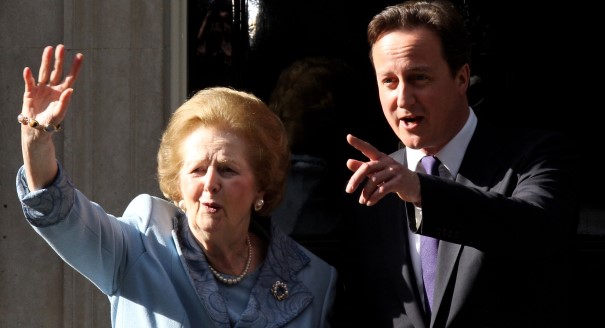In Britain’s poisonous debate on Europe, many Euroskeptics from inside and outside the ruling Conservative Party still take their cues from former prime minister Margaret Thatcher. But while her status as an untouchable conservative heroine might be justified on economic grounds, it is utterly overrated when she is judged on her record as a strategic thinker. She faced two major geopolitical challenges during her tenure, and she was wrong on both: Britain’s role in the EU, and German reunification.
Thatcher’s biggest failure was to overlook the geopolitical potential of EU integration. In her later years, all she ever saw when she looked at Brussels was a bureaucratic monster that threatened British sovereignty. Many of her criticisms of the EU were and still are justified (yes, the Common Agricultural Policy is an abomination). But it is troublesome that she lacked the farsightedness to understand that if Britain wanted to matter in a globalized world, it needed to be part of a Europe that was sufficiently united to compete on the world stage.
Thatcher was a significant reformer at home. She modernized the British economy—though not without inflicting enormous pain—and forced the political Left to embrace the Third Way. She unleashed the positive powers of the market and ended the British malaise of the 1970s. She also showed strong leadership during the 1982 Falklands War, albeit primarily for domestic reasons at a time when she needed to save her first term from early collapse.
She still is heralded as a freedom fighter in Central Europe, even though she played the realpolitik game with the Soviet Union just as well as any Western leader, but is not remembered as a freedom fighter in South Africa or Chile. Her record remains disputed, and her name and personality still polarize opinion today.
Thatcher’s most lasting legacy, however, is that she established the parameters of the British debate on the EU—parameters that still apply today. As her conservatism morphed into obstinacy, she presented the EU as a concept that was hostile to the UK. Large parts of the Conservative Party have never recovered from this view.
The problem with this legacy is that it cuts Britain off from a reasonable debate about the EU. Instead of talking about Europe’s most important geopolitical project of the twenty-first century, the discussion in Britain is about a bogeyman.
Never was a positive British contribution to the EU debate as sorely needed as it is today. The European integration project has long turned from guaranteeing internal peace to building an entity that can provide peace and stability in Europe’s neighborhood and beyond. Instead of leading on this issue as the European country that is best prepared to do so, Britain undermines what it likes most about the EU—the single market—by challenging one of its cornerstones—free movement of EU citizens.
The UK is also turning its back on EU enlargement, a policy it once championed. And it fights any progress to make the bloc a more effective foreign policy enabler for its member states.
It is true that the EU is not in good shape today. It is far from being the actor it needs to be to protect the interests of 500 million people in a globalized world. It is not yet the hard-nosed power player that it must become in the face of turmoil in the South, unfinished transition and Russian bullying in the East, and China’s emerging clout in the world.
But closer European cooperation is the only answer to increased instability, competition, and challenges to the liberal world order. The future of EU integration will not be based on the treaty-enshrined idea of “ever closer union” or on a United States of Europe. Yet closer cooperation it will be, some of it through the central institutions, some through intergovernmental decisionmaking.
The great debate on the EU’s future shape and its role in the world has only just started. In that debate, Margaret Thatcher’s strategic recipes will not suffice. Ultimately, her approach to Britain’s role in Europe was too small-minded. Unlike former German chancellor Helmut Kohl, whom she famously disliked and with whom she shared a hardworking, petty-bourgeois background, she could not escape her small-mindedness on questions of geopolitics.
Kohl, when history allowed it, understood the size of change and set out to shape it. Thatcher holed herself up and wanted to preserve the status quo. In her view, freedom was great for Central Europe, but not for those East Germans who wanted to join the West German democracy after 1989.
For too long, Thatcher’s legacy has been cited as an excuse for what is wrong with Prime Minister David Cameron’s EU policies. For too long, the bookkeeper’s approach to Europe has been great at pointing out the EU’s many mistakes, but it has made Britain too blind to see the bigger picture.
The EU has its profound weaknesses. But it is also Europeans’ last best hope if they want to retain their freedom, affluence, and cultural wealth at a time when the United States is less and less interested in subsidizing those benefits. The world has changed. Ever closer union is dead, but so too is Thatcherite parochialism. Britain needs to move beyond its inner Maggie to help create the Europe it needs.






